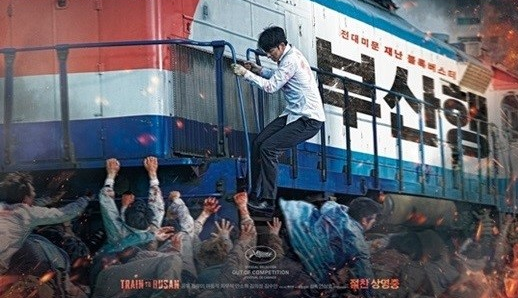Cover Image: Source
The zombie genre is something that has been done to death. There have been rom-com zombie films, comedy spoof zombie films, Nazi zombie films, indie drama zombie films, big-budget zombies, shoestring budget zombies, fast zombies, slow zombies, reanimated zombies, viral-infected zombies, zombie TV shows, zombie novels, and even zombie anime. For something like Train to Busan, lifting elements from other zombie media is just an inevitability at this point. Some of the most noticeable points of inspiration look to be recent hit anime series Kabaneri of the Iron Fortress, the fast zombie-innovating film 28 Days Later, and 2013 foreign film cult favorite Snowpiercer. However, whereas the previous films/TV series take place where horrible conditions have already settled in, Train to Busan covers a roughly 36 hour period at the exact start of the zombie spread.
While Train to Busan features many familiar zombie tropes, I feel as though it’s particularly effective where other zombie media has faltered and that is with the characters. The central relationship between a selfless daughter and her selfish father is a simple story, but an effective one to be played out over this environment. Busan uses its zombie setting not only for scares and action, but to play on certain characters’ insecurities and beliefs. At one point, it uses the zombie setting to show the audience their own gullibility for sensationalist reporting and fear-mongering. Again, while this isn’t a particularly unique idea from Train to Busan, it does show that its creative team understands the zombie genre. Because of this understanding, Busan is able to effectively create a cast of characters from different walks of life and earn the audience’s sympathies when some are taken away.
One of the standout performances is Ma Dong-seok (known in America as Don Lee) as fearless brawler, Sang-hwa, who stops at nothing to protect his pregnant wife and those around him. Furthermore, his selfless attitude and playful quips serve as a terrific foil to the serious (and seriously selfish) protagonist Seok-woo played by Gong Yoo. Dong-seok steals every scene he’s in as far as I can tell and creates a few good action sequences along the way. The fight en route to Car 14 is one of my favorite sequences put together all year. It isn’t merely in the blows that the battle is fought, but the strategizing around the zombies’ weaknesses that make it a memorable fight for me.
Another thing that really stands out to me is how effectively the scale for the zombies are used. 2013’s World War Z had a massive scale of zombies, yet I hardly remember most of that movie for the simple fact that I just got desensitized to seeing so many. Train to Busan seems to have enough discipline to know when to use a conservative amount of zombies and a frighteningly large amount of zombies. Some great examples of this come at the Daejeon Train Station and towards the climax of the film. The variety in zombie numbers help to break up the monotony of zombie hordes and properly raise the stakes when it’s most important for the film.
With that being said, there are still several zombie clichés that plague the movie. Some characters have a maddeningly poor sense of their surroundings when its convenient for a scare. Many sequences of zombie transformations and movements are clearly sped up and broke immersion for me several times. Overdramatic music plays whenever a certain mood needs to be evoked. There’s even a corny flashback bathed in white light to drive home how sad a particular moment is supposed to be. I’m not exactly sure how much of this is cultural, but I also found certain scenes to be too overacted and wildly over-expressive for my taste. It’s this stuff that keeps Busan from being one of the truly great zombie films, but it certainly doesn’t keep it from being a worthy entry into a genre that is needing fresh blood.
My Rating: ★★★½ (out of 5 stars; Good)
